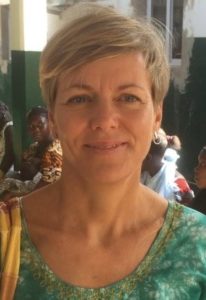GVN Center and Member Spotlight

Christine Benn
Professor
University of Southern Denmark
Studiestræde 6, 1455 Copenhagen, Denmark
What are you and your institution currently working on regarding COVID-19?
We are testing large-scale randomized clinical trials in Denmark, Guinea-Bissau, Mozambique and Cape Verde to determine whether BCG vaccine and oral polio vaccine (OPV) can reduce the risk and/or the severity of COVID-19. We hypothesize that live attenuated vaccines have beneficial non-specific effects (see the detail discussion below). This is based on the observations, largely from our field station in Guinea-Bissau. In Denmark, 1500 healthcare workers have been randomly vaccinated to BCG or placebo. In a multi-center study in Guinea-Bissau, Mozambique and Cape Verde, we are also testing the efficacy of BCG vaccine with 1050 healthcare workers. Furthermore, we are testing the efficacy of OPV with 3400 adults above 50 years of age In Guinea-Bissau. We expect to obtain the results by Spring 2021.
Please, describe your research in the area of non-specific effects of vaccines, as it pertains to SARS-CoV-2?
In Guinea-Bissau, we have studied the effect of routine vaccinations on public health. Surprisingly, live attenuated vaccines, such as measles vaccine, BCG, OPV and smallpox vaccine, provide reductions in all-cause mortality, up to 30-50%. This a prominent outcome compared to the protective efficacy against their target diseases. Since mortality is caused by various infectious diseases, routine vaccination might be beneficial in strengthen the immune system, thus providing a broad protection from infectious diseases. Immunological studies have recently revealed that BCG vaccine induces “trained innate immunity,” as well as “emergency granulopoiesis.” This suggests that BCG vaccination can provide biological mechanisms for the observed reductions in all-cause mortality. Further investigation is clearly needed in this area. If we can identify how these vaccines induce non-specific protection against infections broadly, we can use them cleverly for an emergency vaccination. Currently, we expect that these live attenuated vaccines can provide at least partial protection against severe COVID-19. This will mitigate the impact of the pandemic while we are waiting for a specific vaccine to be developed.
Professional Summary
I am a medical doctor, head of the Bandim Health Project, and a professor in Global Health at University of Southern Denmark.
My research focuses on health interventions and their effect on overall health in real life. Based to a large extent on work done in one of the world’s poorest countries, Guinea-Bissau, we have observed that that vaccines and vitamins affect the immune system in much more general ways than previously thought. These health interventions also interact, and intriguingly, these interactions are often sex-differential.
My main contribution has been to take the observations on non-specific effects of vaccines and vitamins forward to randomized controlled trials, being the PI for many trials testing the overall health effects of vitamin A supplementation, BCG vaccine, oral polio vaccine and early measles vaccine.
I have also bridged to immunology, and explored the biological mechanisms underlying the non-specific effects of both vitamin A and vaccines. We have taken the observations back to Denmark, to test in randomized trials and observational studies whether non-specific effects of vaccines are important in high-income settings as well. We are now testing whether non-specific effects of BCG vaccine and oral polio vaccine can provide partial protection against COVID-19.
Overview of The University of Southern Denmark
The University of Southern Denmark welcomed the first students onto the campus in Odense in September 1966. Now it has five faculties with more than 27,000 students, almost 20% of whom are from abroad, and more than 3,800 employees distributed across our main campus in Odense and regional campuses in Slagelse, Kolding, Esbjerg and Sønderborg. Several international studies document that we conduct world-class research, and are one of the top fifty young universities in the world. With around 115 different study programs in the fields of the humanities, social sciences, natural sciences, health sciences and engineering, graduates of the University of Southern Denmark are now members of virtually every profession in the international community.
In 2019, SDU declared its wish to work with all of the UN’s 17 SDGs. This means reaching out to companies, public institutions and NGOs in the work with the SDG, promoting SDGs as a theme for interdisciplinary research work, and working towards a sustainable development in the operation of the university, to make SDU greener, healthier and more diverse.
